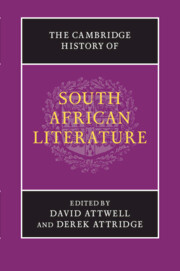Book contents
- Frontmatter
- Introduction
- PART I ORATURES, ORAL HISTORIES, ORIGINS
- PART II EXPLORATION, EARLY MODERNITY AND ENLIGHTENMENT AT THE CAPE, 1488–1820
- PART III EMPIRE, RESISTANCE AND NATIONAL BEGINNINGS, 1820–1910
- PART IV MODERNISM AND TRANSNATIONAL CULTURE, 1910–1948
- PART V APARTHEID AND ITS AFTERMATH, 1948 TO THE PRESENT
- 19 The fabulous fifties: short fiction in English
- 20 Writing in exile
- 21 Afrikaans literature, 1948–1976
- 22 Afrikaans literature after 1976: resistances and repositionings
- 23 The liberal tradition in fiction
- 24 Black Consciousness poetry: writing against apartheid
- 25 Popular forms and the United Democratic Front
- 26 Writing the prison
- 27 Theatre: regulation, resistance and recovery
- 28 The lyric poem during and after apartheid
- 29 Writing and publishing in African languages since 1948
- 30 Writing the interregnum: literature and the demise of apartheid
- 31 Rewriting the nation
- 32 Writing the city after apartheid
- PART VI SOUTH AFRICAN LITERATURE: CONTINUITIES AND CONTRASTS
- Index
- References
30 - Writing the interregnum: literature and the demise of apartheid
from PART V - APARTHEID AND ITS AFTERMATH, 1948 TO THE PRESENT
Published online by Cambridge University Press: 28 January 2012
- Frontmatter
- Introduction
- PART I ORATURES, ORAL HISTORIES, ORIGINS
- PART II EXPLORATION, EARLY MODERNITY AND ENLIGHTENMENT AT THE CAPE, 1488–1820
- PART III EMPIRE, RESISTANCE AND NATIONAL BEGINNINGS, 1820–1910
- PART IV MODERNISM AND TRANSNATIONAL CULTURE, 1910–1948
- PART V APARTHEID AND ITS AFTERMATH, 1948 TO THE PRESENT
- 19 The fabulous fifties: short fiction in English
- 20 Writing in exile
- 21 Afrikaans literature, 1948–1976
- 22 Afrikaans literature after 1976: resistances and repositionings
- 23 The liberal tradition in fiction
- 24 Black Consciousness poetry: writing against apartheid
- 25 Popular forms and the United Democratic Front
- 26 Writing the prison
- 27 Theatre: regulation, resistance and recovery
- 28 The lyric poem during and after apartheid
- 29 Writing and publishing in African languages since 1948
- 30 Writing the interregnum: literature and the demise of apartheid
- 31 Rewriting the nation
- 32 Writing the city after apartheid
- PART VI SOUTH AFRICAN LITERATURE: CONTINUITIES AND CONTRASTS
- Index
- References
Summary
In a celebrated series of essays written in a burst of intellectual and creative energy in the mid 1980s, Njabulo Ndebele set out some key terms for considering the history, trajectory and imperatives of South African literature. Some of these terms – ‘spectacle’, ‘interiority’, ‘information’, ‘counsel’ – will come up again for discussion in this chapter, as will the wider resonances of Ndebele's contribution. Beyond the terms themselves, however, there is a deeper – one might say foundational – aspect in Ndebele's approach, which may be even more significant in considering writing in South Africa in the 1980s and early 1990s – the long decade of its ‘interregnum’ through the final years of apartheid. It is an aspect on one level simple, but nonetheless profound – that Ndebele established a perspective for considering the history of South African literature on formal grounds. Moreover, these were not the formal or generic grounds of standard literary history – realism, romanticism, experimentalism – though such terms can and do have their place. Rather, these formal terms had to do with what informed South African writing – what shaped it, gave it perspective: its own versions of ‘interiority’, as it were.
The implicit challenge in Ndebele's formal approach has not much been taken up in the writing of South African literary history, but along with a number of other patterns in the period, it does allow us to reach towards certain features at the heart of the era.
- Type
- Chapter
- Information
- The Cambridge History of South African Literature , pp. 633 - 651Publisher: Cambridge University PressPrint publication year: 2012
References
- 4
- Cited by



